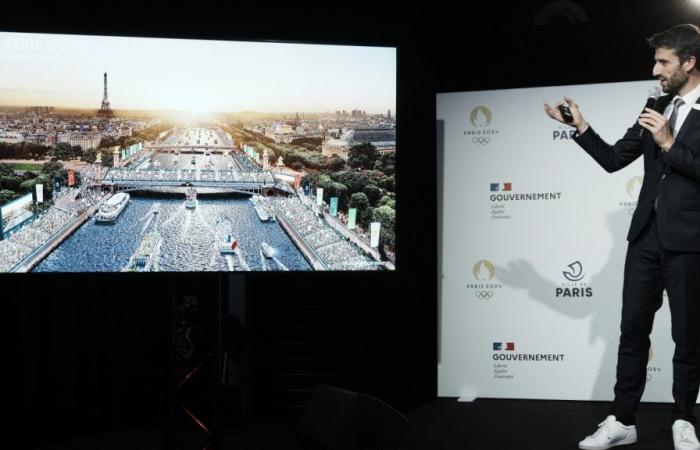
GENEVA (AP) — It has been 100 years since the Olympic Games were last held in Paris and 128 years since their modern revival in Athens. But they can still offer a fresh look for their 33rd edition.
Here’s a look at the innovations on display at the Paris 2024 Olympic Games:
INAUGURAL CEREMONY
This unprecedented event at the Paris Games could go down as the defining image of the Games: Thousands of athletes in a flotilla sailing west along the Seine River at dusk toward the Eiffel Tower on Friday, July 26.
The ambitious idea was that the spectacle that sets the tone for the Games would not take place this time in a stadium with expensive tickets. Instead, it will move closer to the city, where many more people can appreciate it.
A crowd of 320,000 people is expected along the riverbank along the six-kilometre route from the Pont d’Austerlitz to the Pont d’léna.
Tickets will be free for approximately 220,000 guests and spectators protected by security personnel who will be watching from the upper riverbank.
Approximately 100,000 paying spectators, including luxury hospitality packages, will watch from the lower riverbank and around the Trocadéro square, where the parade will end looking towards the Eiffel Tower.
It is the boldest plan for a major Olympic ceremony – the Youth Olympic Games in 2018 tested a non-traditional opening in central Buenos Aires – and its extensive security risk.
The original plan of 600,000 spectators allowed for more spontaneity in the city, but less security.
French President Emmanuel Macron has acknowledged that the parade along the river could be moved if the city is again targeted by terrorist attacks as it was in 2015. The closing ceremony on August 11 is scheduled at the Stade de France after hosting athletics in the past week.
“Since we are professionals, obviously there are plans B, C, etc.,” Macron said in December.
Ideally, Paris will implement its plan A.
GENDER EQUALITY
Paris was where women competed for the first time in the Olympic Games – in 1900 with 22 out of 997 athletes competing.
Women competed in tennis and golf, as well as team events such as sailing, croquet, and equestrian.
Great Britain’s Charlotte Cooper became the first woman to win an individual gold medal with her victory in the women’s singles event.
This time, for the first time, women have the same proportion as men in a registration quota that has 10,500 athletes in 329 events.
“This is our contribution to a more gender-equal world,” said IOC President Thomas Bach.
That 2.2% proportion of women in 1900 increased to 23% in the 1984 Games held in Los Angeles, where the American Joan Benoit won the first women’s Olympic marathon.
There were debuts in Los Angeles for rhythmic gymnastics and for the formerly called synchronized swimming. It is now called artistic swimming and the men will make their Olympic debut in Paris.
With the total number of female athletes at 50%, the IOC puts pressure on Olympic teams that traditionally sent only men to compete. Saudi Arabia, Qatar, and Brunei included women for the first time at London 2012.
The proportion reached 48% at the 2021 Tokyo Olympics, when teams were encouraged to select a man and a woman to be flag bearers at the opening ceremony.
With gender equality on the playing field, one challenge for the IOC is to one day have a female president. Nine men have led the body since 1894. The next presidential election is scheduled for March 2025, and the Olympic body has only once had a female candidate.
In 2001, Anita DeFrantz, bronze medalist in rowing for the United States at the 1976 Montreal Games, was the first eliminated in a five-candidate competition, won by Jacques Rogge.
THE MONETARY PRIZE
In Paris, prize money will be paid to gold medallists directly from Olympic revenues, a controversial break with tradition.
But not by the IOC, which has clearly opposed the promise made in April by athletics’ governing body, World Athletics.
Each of the 48 gold medallists in athletics in Paris will receive 50,000 dollars in prize money. For Los Angeles 2028, World Athletics also wants to award money to the silver and bronze medallists.
Prize money has become routine for Olympic athletes as they are remunerated by state governments and national Olympic bodies.
France will pay each of its gold medalists $85,000. The United States Olympic and Paralympic Committee is running “Project Gold,” which will award $37,500 for gold, $22,500 for silver, and $15,000 for bronze.
However, the $2.4 million pledge announced by World Athletics president Sebastian Coe will come directly from the sport’s share of the IOC’s multimillion-dollar revenue from broadcast and sponsorship deals.
In Tokyo, the IOC set aside approximately $540 million for a collective of sports bodies at the Summer Games, known as ASOIF, to distribute among its members. Athletics is a top-level Olympic sport, which is why it earned the highest income of almost $39.5 million.
The IOC does not want a trend to develop. He prefers that governing bodies invest their Olympic revenues in development projects. World Athletics is among the few with enough money to reward elite athletes.
MAKING PATH
Break dancing will make its Olympic debut in Paris.
The 50-year adventure of break dancing from the Bronx will take this expression to the Place de la Concorde, where 16 b-boys and 16 b-girls will compete from 9 to 10 August.
The Olympic pathway for the sport overseen by the World Dance Sport Federation follows the concept of the opening ceremony at the centre – tested at Buenos Aires 2018 and realised in Paris.
Break dancing could be a one-time event. It was banned from 2028 in Los Angeles before it had a chance to make a name for itself. Los Angeles organizers preferred to give cricket, flag football, lacrosse and squash their modern Olympic debuts. It is not yet known whether Brisbane will make an effort to give break dancing a second chance in 2032.
SURFING EMERGES
We must add surfing on a beach in Tahiti to the postcard images of the Paris Olympic Games.
Hosting an event half a world away from the host city of the Olympics is not unique, although this time it is by design, and simultaneously.
In 1956, quarantine rules for horses in Australia meant that equestrian events were held in Stockholm, five months before the opening ceremony in Melbourne.
Paris organizers stuck to their desire to bring surfing to French Polynesia in the Pacific Ocean, even as the IOC preferred to use a host option, such as the Atlantic Ocean resort of Biarritz.
Teahupo was approved and the controversy that followed was not about excessive long-haul flights but about the construction of a tower for judges in the sea that could damage the coral reef.





